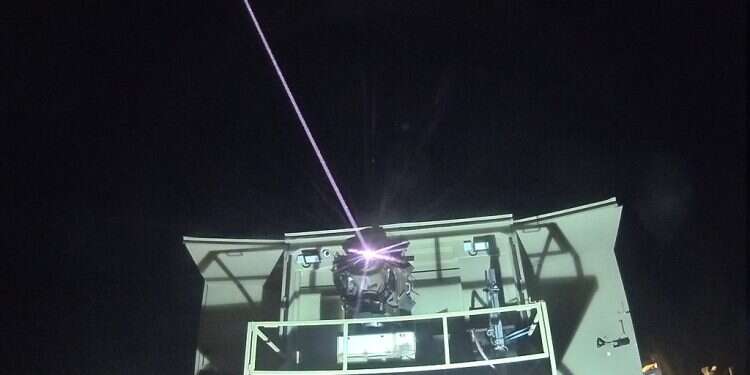The historic Jerusalem Declaration, signed Thursday by US President Joe Biden and Prime Minister Yair Lapid includes an understanding about the US coming on board as a partner in Israel's cutting-edge Iron Beam laser interceptor system.
Follow Israel Hayom on Facebook, Twitter, and Instagram
"The countries express enthusiasm to move forward the US-Israel defense partnership through cooperation in cutting-edge defense technologies such as high energy laser weapons systems to defend the skies of Israel and in the future those of other US and Israel security partners," the declaration reads.
The phrase "other security partners" appears to hint that the system might be sold to the United Arab Emirates and other states that are party to the Abraham Accords, and possibly additional countries that might enter into a future regional defense pact that the US is trying to promote in the Middle East.
Iron Beam is projected to be operational within three years. Former Prime Minister Naftali Bennett said that one system would be set up on Israel's border with the Gaza Strip in 2023.
Iron Beam is the first laser-based defense system of its kind, and is expected to comprise a strategic shift in Israel's ability to cope with rocket and missile attacks.
The main drawback to the Iron Dome missile defense system, which intercepts missiles using rockets, is the high cost of the interceptors. Each rocket or mortar Hamas fired at Israel costs the terrorist organization anywhere from a few hundred to a few thousand dollars, whereas a single Iron Dome interceptor rocket costs some $50,000. In most cases, Iron Dome fires its interceptors in pairs, bringing the cost of a single interception to some $100,000.
The cost of the system means that massive rocket onslaughts, such as the ones Hamas fired at Israel during Operation Guardian of the Walls in May 2021, carry an enormous defense cost for Israel, not to mention put it at risk of running out of interceptor rockets. After the May 2021 operation, the US provided Israel with a special $1 billion grant to restock.
Laser interception is much less expensive, costing an estimated $2,000 at most per interception.
Another advantage to Iron Beam is that it intercepts rockets immediately after they are fired – over the Gaza Strip or Lebanon, rather than as they are about to fall. This new capability will mean far fewer warning sirens in western Negev communities. In the event of a successful laser interception, no alert will go off.
In addition to Iron Beam, which operates at ground level, Israel is also in the initial testing stages of an airborne laser system to be affixed to aircraft, which is designed to allow one or two aircraft to provide coverage for all of Israel, rather than having to deploy dozens of rocket-based batteries.
The US, meanwhile, is working on a laser system capable of intercepting long-range missile. The US laser is more powerful, measuring 1,000 kw or more. The Americans have begun initial tests of the new system, spurred on by concerns about the hypersonic missiles China is developing.
Subscribe to Israel Hayom's daily newsletter and never miss our top stories!




